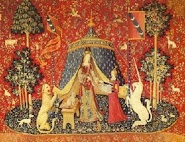 Occasionally, an historical work fuels popular imagination. Natalie Zemon Davis' 16th Century case of The Return of Martin Guerre gave a glimpse of history that inspired many young historians to further research, as well as an internationally successful film and at least one Hollywood spin-off of the plot of this stranger-than-fiction-tale from this distant time past.
Occasionally, an historical work fuels popular imagination. Natalie Zemon Davis' 16th Century case of The Return of Martin Guerre gave a glimpse of history that inspired many young historians to further research, as well as an internationally successful film and at least one Hollywood spin-off of the plot of this stranger-than-fiction-tale from this distant time past.In 1983, this eminent Princeton professor reexamined the memoires of two judges in this exceptional case, including their carefully notated examination of witnesses, published only a few years after the actual events. Their work represents a remarkable documentary of 16th century thought and attitudes of the parlements, public officials in the lower tiers of the nobility whose offices were generally purchased and could be inherited, generally with additional payment of fees, or conferred for service to the Crown.
The attitudes of the judges in the case of the false Martin Guerre caused one of them, Jean de Coras, to call the story "tragic," despite the fact that the people involved were of low estate. His interest in understanding the motivation, moral choices, and underlying character of the accused represents a remarkable bridging of class lines for the early modern era. Could these humble, uneducated people be so thoughtful and creative as to be capable of shaping and creating their own identities? Of forming a marriage based upon personal choice and natural affection? Of deceptively and steadfastly protecting their choices, until their concern for each other and their children forced them to change course? These questions fascinated Davis and the sixteenth century judges who later wrote detailed accounts of the case. They fascinate us today as we attempt to comprehend the minds of people in an age so far removed from our own.
 The Guerre family was not by any means among the very poor of the early modern era--they had dowries, property, land-holding relatives, a thriving business in brick-making, as well as managing many other properties which they rented out to others. They were the upper echelon of common peasantry, not perhaps literate, but they were ambitious, hard-working, and intelligent. In Davis' book, their lack of reliance for their own moral certainty upon the teachings of the Catholic church and the strength of their marriage bond, among other evidence in the familial and regional records, leads the author to suppose they may have had some sympathetic Huguenot connection with the Jansenist judge in the case.
The Guerre family was not by any means among the very poor of the early modern era--they had dowries, property, land-holding relatives, a thriving business in brick-making, as well as managing many other properties which they rented out to others. They were the upper echelon of common peasantry, not perhaps literate, but they were ambitious, hard-working, and intelligent. In Davis' book, their lack of reliance for their own moral certainty upon the teachings of the Catholic church and the strength of their marriage bond, among other evidence in the familial and regional records, leads the author to suppose they may have had some sympathetic Huguenot connection with the Jansenist judge in the case.The real Martin Guerre--who left his wife and later returned--was hardened by his natural disposition and by his sojourn in Spain as guest of a strict monastic order and the Spanish Inquisition. His total lack of sympathy and or responsibility for having abandoned his wife and family accorded with orthodox Catholic teaching that marriage was indissoluble and remarriage unthinkable, even on grounds of desertion. In contrast, the imposter, Arnaud du Tilh, had been a loving husband to the deserted wife, Bertrande and king father to their children.
The human interest of the story is of course compelling. In addition, the book explores many themes and attitudes, including identity, gender roles, agency, community, marriage and family, development of law, the charivari, and literacy. It is little wonder that it was made into an excellent French film, as well as at least one Hollywood spin-off. It is a great tale.
But its most compelling aspect for me is the humanity of the judge Jean de Coras, his compassion for Bertrande and the imposter, Arnaud du Tilh, and his distaste for the real Martin Guerre. He makes the story come to life, and we see the defendants through his eyes. I'm always amazed by the immediacy of original sources; truth is so much more amazing than fiction. And this is a tale loaded with intrigue, lies, villains and unlikely heroes--and heroines. Above all,
 the book explores the attitudes of 16th Century people in the south of France. We witness their dignity, cruelty, ignorance, intelligence, pride, affection, and bravery. They seem profoundly like ourselves, inhabiting a world that is much more difficult and harsh than life in Europe and America today.
the book explores the attitudes of 16th Century people in the south of France. We witness their dignity, cruelty, ignorance, intelligence, pride, affection, and bravery. They seem profoundly like ourselves, inhabiting a world that is much more difficult and harsh than life in Europe and America today.If we dismiss these people as less human than ourselves in any way, other than their lack of modern education, opportunity, and privilege, we will undoubtedly view contemporary victims of isolation, poverty, illiteracy, and violence with similar disdain.
Be sure to see the French-language film versionwith Gerard Depardieu in his glorious youth!
